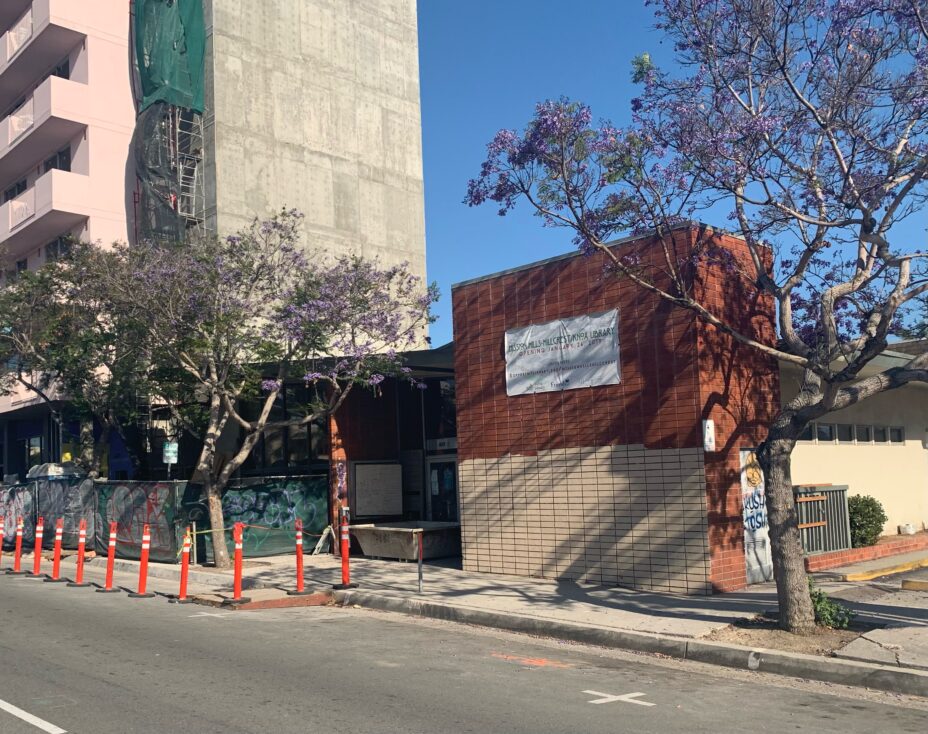Designation of Old Mission Hills Branch Library Upheld, Redevelopment Allowed
By Jennifer Machian
On Tuesday, June 20, 2023, the San Diego City Council voted 5 to 3 to uphold the historic designation of the old Mission Hills Branch Library, ending a long-simmering debate over the fate of the building.
The Library’s historical designation originated from a 2019 nomination by Mission Hills Heritage (MHH), a preservation advocacy group that aims to retain the historic resources of Mission Hills. At the time, the Library—an iconic, mid-century modern, civic building located at the gateway of Mission Hills—had been recently vacated and was at risk of complete demolition for redevelopment as permanent supportive housing.
“The community wanted to save the building,” says Barry Hager, a MHH founder, referring to a 2018 survey that the Mission Hills Business Improvement District conducted showing community support for saving the structure. According to Hager, for MHH, the nomination was never about preventing permanent supportive housing or any other use; it was intended to preserve the Library.
In September 2020, the City’s Historical Resources Board agreed that the building was historic. It considered the Library a “slam dunk” and voted 9 to 1 to designate the Library as a historical resource. Clint Daniels, a Mission Hills resident and chair of Circulate San Diego (a nonprofit with development-industry financial ties), appealed the designation five days later.
In his crusade to overturn the Board’s decision, Daniels, a self-proclaimed YIMBY who has made it a habit to oppose historical designations, has consistently argued that MHH pursued designation of the Library to prevent use of the site for permanent supportive housing.
The appeal, however, languished for over two years. Only after MHH demanded that the City set the appeal for a hearing, did Daniels finally submit documentation supporting his case 30 months later. During that time, the building fell into neglect, acquiring broken windows and graffiti.
Hager questions, “Why Daniels didn’t move the appeal forward expeditiously if he thought permanent supportive housing was needed so urgently” and speculates that the long-pending appeal clouded title to the building slowing its path to re-use. In fact, a historical designation does not prevent any particular use of a structure.
Yet, Daniels told City Council at Tuesday’s appeal hearing that “today’s [appeal] is first and foremost about the City’s historic designation process being used to prevent affordable housing in Mission Hills.”
The City’s municipal code only allows City Council to overturn a designation if it finds factual or procedural error in the decision of the Historic Resources Board, or if new information is presented. Daniels listed several alleged factual and procedural errors, but councilmembers Joe LaCava, Stephen Whitburn, Marni von Wilpert, Kent Lee, and Raul Campillo disagreed with the grounds and voted to uphold the designation.
“I don’t see an error that is clear enough . . . to overturn the decision of the Historical Resources Board,” Whitburn said. In upholding the designation, Whitburn emphasized that “the City can convert this site into affordable housing or another use, regardless of our decision today.”
That determination was a disappointment to Daniels, who told CBS8 that the decision had made it “much more difficult to” use City assets to create more housing.
The assertion that the designation precludes use of the Library for housing, or makes it more difficult, “is a fiction,” according to Hager, who says “Whitburn got it right.” In the case of the Library, Hager notes that preservation only requires maintaining the front façade to the depth of one room, leaving the remainder of the building for redevelopment as housing or some other use.
No doubt, Daniels has continued to demonize MHH for allegedly weaponizing the historical designation process. His arguments are nothing new.
Preservationist groups are often blamed for slowing development of low-income housing. In truth, development across San Diego’s downtown—not preservationist policies—shrunk the City’s number of single room units, which are commonly used by individuals one-step above homelessness, from 14,000 in the 1980s to less than 3,000 units today.
Regarding Daniels’ continued accusations, Susan Dean, a MHH member who attended the appeal hearing, says, “His assertions seem to have been spawned by the misguided notion that historical preservation is incompatible with development – and that is not true.”
Echoing Hager’s enthusiasm for repurposing historical buildings, Dean explains that “the skilled application of adaptive reuse principles can integrate historical resources into the cityscape and tell a story that is unique to San Diego – not just Anytown, USA.”
These concepts are lost on Daniels, who in a social media post vowed to “appeal every designation until” the City reforms its laws relating to historical designation.
In fact, at June’s Historical Resources Board meeting, Daniels opposed every item on the agenda, including historical designation of the Ocean Beach Pier. Whether he succeeds in any of these efforts remains to be seen.
As for the Library, Daniels’ loss has saved it from being a casualty of history.
Jennifer Machian has a degree in Mass Communications from the University of Minnesota’s Hubbard School of Journalism and is a Mission Hills resident.

Category: Architecture, Books, Business, Education, Events, feature, Historical, Homeless, Local News, School, Students







